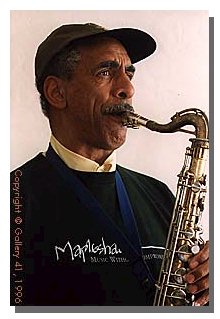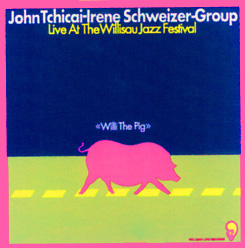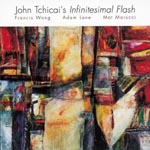
A FIRESIDE CHAT WITH JOHN TCHICAI
Although he probably gets this a lot, I am a lifer in the John Tchicai bandwagon because of his playing (alto saxophone) on John Coltrane's majestic Ascension recording. But he did some memorable work as a member of the New York Art Quartet with Roswell Rudd and Milford Graves. Tchicai has also performed alongside Cecil Taylor, Archie Shepp, Albert Ayler, and Don Cherry, so his resume is impressive by any standards. We spoke about his work with Coltrane, his European roots, and his latest recording on the Buzz label, John Tchicai' s Infinitesimal Flash, all unedited and in his own words.
FRED JUNG: Let's start from the beginning.
JOHN TCHICAI: Well, to be honest, Fred, that was a long process. Back in Denmark, we were listening to a lot of music and at a certain point our parents put us to play some violin. That was sort of the beginning. Little by little, when we got our own free will, my brother and I started to play the instruments that we really liked and so my brother started on trombone and myself tried out for trumpet and that didn't work and then I switched to alto saxophone. That was sort of the beginning and we went to different teachers and music schools.
FJ: Was the saxophone more to your liking?
JOHN TCHICAI: I liked it already from listening to it, listening to records by alto players like Johnny Hodges and also tenor players like Earl Bostic. The shape of the saxophone also felt real nice, the way it looked. There wasn't any problem. It was much better than the trumpet. The trumpet felt funny (laughing).
FJ: How lengthy were you studies at the conservatory?
JOHN TCHICAI: I went to the conservatory in Arhus in Denmark for about, I was in what is called a conservatory class, four year education, but I skipped it because I got tired of playing classical clarinet. That was the recommendation for my teacher, that I should try that route, learning to play clarinet and classical music. I didn't have any jazz and they didn't teach jazz there, so I lost interest, but I continued for another year with music theory and history and after that, I was just seeing individual teachers.
FJ: Influences?
JOHN TCHICAI: Music has been so much a part of my life, ever since I can remember, all the way back to when I was very little. I went to a lot of classical concerts, listening to the known composers from the classical music. After I came to New York, my interest in modern classical music started to blossom. People like Schoenberg, a little bit, Stravinsky, a lot, Prokofiev, a lot, and some of the French composers, Debussy, a whole bunch of modern composers.
FJ: Sounds like your pallet did not divide the music into genres.
JOHN TCHICAI: No, it was just music. I really didn't see any difference. I just took the whole thing and then when I started to play myself, I became much more active in the jazz idiom. That sort of shaped my growth.
FJ: Assess the impact that John Coltrane has had on you.
JOHN TCHICAI: Yeah, very great impact, both from dealing with the person, not very often, but when we did the recordings we met a couple of times at festivals where we both played and a couple of times where I sat in with him in New York. He's my type of person. He's a mild, friendly, warm person. He's not a shark and he's not an unpleasant person, using his elbows like many people do in the music. He was not an ego trip. For the music, he was very strong personality, very sincere music, and things cannot be better than that for one person. That is just it.
FJ: How about Ornette Coleman?
JOHN TCHICAI: Ornette, I know also personally. But he hasn't the same influence on me. I like what he does and I like his first inventions with the first records that he did very much. I was listening to it a lot. I think he's a great innovator and a great composer and a player also. He didn't have the same impact as John Coltrane and also, I've never felt the same spiritual connection with Ornette Coleman as with John Coltrane.
FJ: When did you move to New York?
JOHN TCHICAI: That was in 1962, in the fall of 1962.
FJ: Improvised music in New York was thriving at that period.
JOHN TCHICAI: Oh, yes. That was very different. There were quite a few places in downtown Manhattan, where you could play in comparison to Copenhagen, where there wasn't very many places. There was only one or two or three places where they had music on an ongoing basis. Especially the more adventurous music and experimenting music, there wasn't much place for that. But in New York, there was much more possibilities and also many more musicians that were interested in newer music.
FJ: Was it difficult for a European musician playing experimental improvised music to find work? JOHNN TCHICAI: It was easy enough to play for the door or for ten dollars for an evening or stuff like that, but real well-paying gigs, that was not easy to come by. That was very difficult. That was only the well-known people, the established, mostly bebop people and of course from the other jazz traditions that got jobs, not young, experimenting improvisers.
FJ: Let's touch on your work with Archie Shepp and Don Cherry in The New York Contemporary Five.
JOHN TCHICAI: I think it was '63, when we started to get together, Archie Shepp and myself and talk about making a group, which became The New York Contemporary Five. That was my first experience as a bandleader after coming to America. Up until then, I had been members of other groups like Bill Dixon and different other bands. But when we went to Scandinavia with The New York Contemporary Five, that was like a great boost for us because we played much more there than it was possible for us to do in New York and getting paid for it.
FJ: And the New York Art Quartet, with which you recorded a self-titled album for ESP.
JOHN TCHICAI: We did two albums. We also did one called Mohawk for a Dutch label at that time, it was Fontana. That didn't come out in America. It came out only in Europe and Japan. We did at least two with the New York Art Quartet. Roswell Rudd, Milford Graves, and Lewis Worrell on bass on the first ESP record. That was the time when I really came into my own and I started to realize what I needed to do in music and what the best idea in music was. The polyphonic element came into the music and also the compositional element came in a lot when we played with that group. It was a great workplace for experiments with this combination because they were all so creative, very different backgrounds.
FJ: As an educator and as an artist, do the terms avant-garde or free have any significant meaning in reference to the music?
JOHN TCHICAI: No, it is only labels and vague definitions of different things. You talk about something specific in this group or that group or this person, then it is easier to say it is free music they do or is it avant-garde. It is just names. You are not talking about a specific thing. There is no difference between free jazz and avant-garde. We need some kind of language to speak about it. We're not satisfied with only listening to the music. We need also to talk a regular, normal verbal language about what it is we're doing. We need some vocabulary about the music and so people use different terms. The best thing is of course to take it in with your feelings and listen to it.
FJ: Let's talk about your new release on the Buzz label, John Tchicai's Infinitesimal Flash.
JOHN TCHICAI: Yeah, we recorded it last fall. The group is Francis Wong on tenor sax and flute. He lives in the Bay Area and then Mat Marucci, who is living close to me, here in Sacramento and Adam Lane. Mat Marucci plays the drums and Adam Lane, the bassist, lives also in the Bay Area. He came to this area recently from Los Angeles. It is great that he came and I'm very happy to play with him. By the way, Fred, I am playing with him tonight at a gallery opening here in Davis. It is a pretty strong record and from one reviewer, he thought there was not one dead track or dead moment on that record and that might be true. It depends on your taste also. It is a strong record in the sense that many of the pieces are forceful like Coltrane, very strong. There are also mild things where Francis plays flute. It is a very colored from Francis' compositions because Francis is of Chinese background so several of the compositions are folk songs arranged by Francis that gives it an Asian color and mood also.
FJ: You are teaching.
JOHN TCHICAI: I am teaching at UC Davis. I have two classes, Monday and Thursday. I teach instrumental music. I call it UC Davis Sound and Poetry Source. We do some work with putting words to music. We do some kind of rap stuff.
FJ: What advice do you convey to the students in your class?
JOHN TCHICAI: If you want to be an artist and a musician in the music business here, it is a tough business to go into and you really have to have your act together, both mentally and physically and also intellectually and of course you need talent also to come on the scene as a musician. It is not so easy. You don't get the same support here unfortunately as you do in many countries in Europe, where you can ask for grants and go on small tours. You cannot do that here so it is a difficult life.
FJ: Any regrets?
JOHN TCHICAI: No, I think I've been able to make it through and now I have reached the stage that I am so lucky that I got awarded the lifetime grant from the state of Denmark. That sort of saved me from having to deal with going out looking for odd jobs that I didn't want to do and to do day jobs that many musicians have to do in order to stay with the music. So that saved me, so I don't regret it. It has been a long road. I am sixty-four now, so I have been playing now for forty years or so. That's fine. I like it. It has taken a long time. I got that grant in '91 or something like that. That was about time. Maybe I should have gotten a little earlier, but I was the first jazz musician that got it in Denmark.
Fred Jung is the Editor-In-Chief and a Surgeon General's warning. Comments? Email him.


